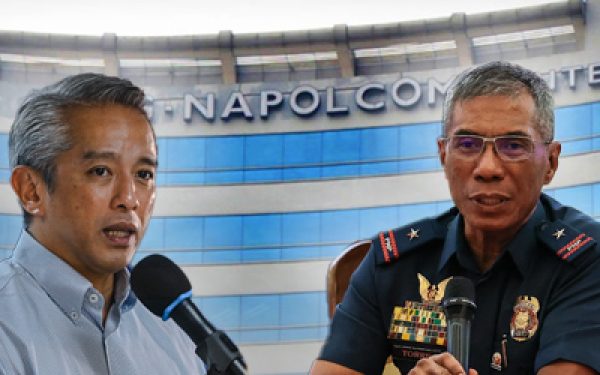The National Police Commission (Napolcom) has nullified the revamp conducted by Philippine National Police (PNP) chief Police Gen. Nicolas Torre III.
In a resolution issued by Napolcom and signed by Interior and Local Government Secretary Juanito Victor “Jonvic” Remulla as chairperson, it emphasized that while the PNP chief has the authority to reassign officers in third-level positions under Republic Act 6975, the commission also holds the power to review, approve, reverse, or modify these reassignments.
Napolcom noted that despite issuing a resolution to strictly remind the PNP of its authority over officer reassignments, the reshuffling within the police ranks allegedly continues.
“The Napolcom, in the faithful exercise of its power of control, and in accordance with its mandate under the law, has resolved as it hereby resolves, to recall, set aside, and correspondingly modify the present designations, assignments, and reassignments, to third level positions issued by the PNP involving the following Police Commissioned Officers,” stated the resolution.
It identified 13 officials, including PLt. Gen. Jose Melencio Nartatez Jr., PLt. Gen. Bernard M. Banac, PMaj. Gen. Robert Alexander Morico II, and others.
“Resolved further, that the Napolcom hereby directs the PNP to immediately issue corresponding orders implementing the above designations, assignments, and reassignments,” Napolcom stressed.
Under RA 6975, or the DILG Act of 1990, which established the PNP, and its amendatory law R.A. 8551 (the PNP Reform and Reorganization Act of 1998), the authority of the PNP chief and Napolcom is detailed.
The law specifies the authority over the appointment and assignment of PNP personnel, particularly in “third-level” positions within the PNP hierarchy, “subject to general guidelines, but not day-to-day control, by Napolcom.”
National Police Commission
The **National Police Commission (NPC)** is a government body responsible for overseeing and improving the efficiency and accountability of police forces. Established in many countries, such as the Philippines (where it was created in 1966) and Sri Lanka, it often handles complaints, sets policies, and ensures law enforcement professionalism. Its history typically reflects efforts to reform policing and enhance public trust in law enforcement institutions.
Philippine National Police
The **Philippine National Police (PNP)** is the national police force of the Philippines, established in 1991 under Republic Act 6975, replacing the former Philippine Constabulary and Integrated National Police. It operates under the Department of the Interior and Local Government (DILG) and is responsible for law enforcement, public safety, and crime prevention across the country. The PNP traces its roots back to early Spanish colonial militias and has evolved through various reorganizations, reflecting the Philippines’ complex history of policing.
Republic Act 6975
Republic Act 6975, enacted in 1990, is a Philippine law that established the Department of the Interior and Local Government (DILG) and reorganized the country’s law enforcement agencies. It created the Philippine National Police (PNP) to replace the former Integrated National Police and Philippine Constabulary, aiming to improve public safety and professionalize policing. The law reflects efforts to strengthen local governance and national security in the post-Marcos era.
DILG Act of 1990
The **DILG Act of 1990** (Republic Act No. 6975) is a Philippine law that established the **Department of the Interior and Local Government (DILG)** to promote local governance, public order, and community development. It reorganized the country’s interior administration, integrating agencies like the Philippine National Police (PNP), Bureau of Fire Protection (BFP), and local government units under one department. The act aimed to strengthen decentralization and improve public safety and local governance in the Philippines.
R.A. 8551
“R.A. 8551,” or Republic Act No. 8551, is a Philippine law enacted in 1998, also known as the *Philippine Fisheries Code of 1998*. It aims to conserve and manage the country’s fishery and aquatic resources, promoting sustainable development and protecting the rights of small-scale fisherfolk. The law addresses issues like overfishing, illegal fishing practices, and the modernization of the fishing industry while ensuring food security and livelihood support for coastal communities.
PNP Reform and Reorganization Act of 1998
The **PNP Reform and Reorganization Act of 1998** is a Philippine law aimed at modernizing and improving the efficiency of the **Philippine National Police (PNP)**. Enacted under Republic Act No. 8551, it introduced reforms such as enhanced recruitment standards, internal disciplinary mechanisms, and community-oriented policing to address corruption and strengthen public trust. The law also redefined the PNP’s relationship with the military, reinforcing its role as the primary civilian law enforcement agency.




